On Diversity and Standards
A Representative's slip of the tongue and the ensuing debate.
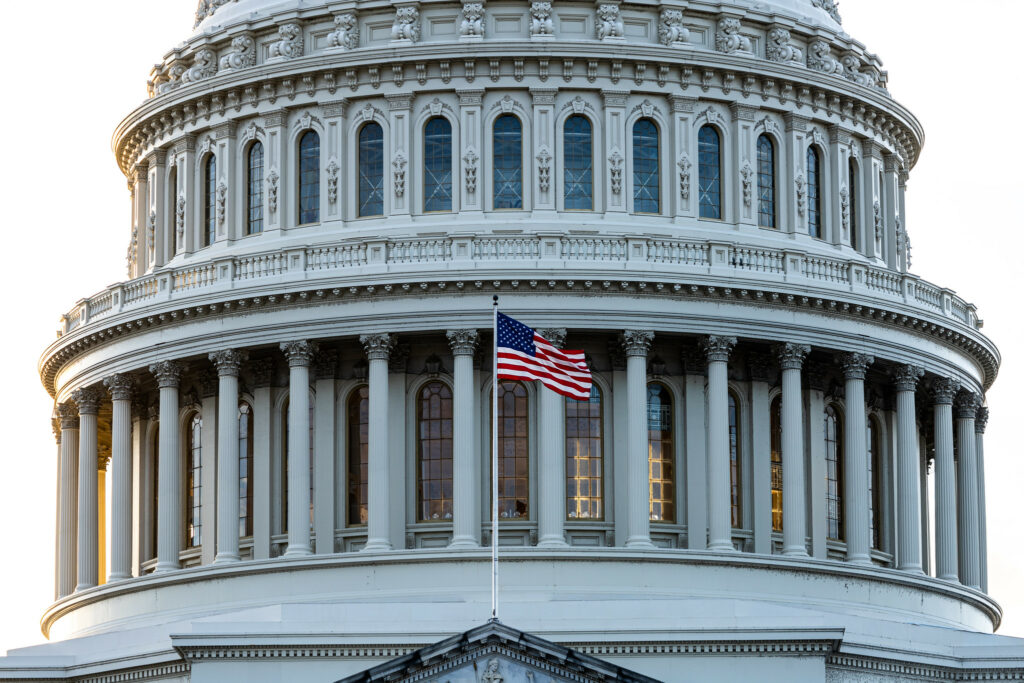
Now for the third in a series of posts that started out as tab clearing, but all grew beyond the limitations of a bulleted list. The themes are all linked and continue to connect to topics that have clearly been on my mind of late. For this post we go to the floor of the US House of Representatives from a little over a week ago via WaPo, GOP lawmaker says he ‘misspoke’ in referring to ‘colored people’ on House floor.
Freshman Rep. Eli Crane (R-Ariz.) said he “misspoke” when he referred to Black Americans as “colored people” on the House floor Thursday while arguing that the military should not focus on diversity — a comment that sparked an immediate outcry in the chamber and that was condemned by Democrats.
[…]
Rep. Joyce Beatty (D-Ohio), a former chairwoman of the Congressional Black Caucus, accused Republicans of using the typically bipartisan defense budget bill to advance a political agenda.
“I’m old enough to remember when Black officers, when women were not allowed to serve,” Beatty said. “You are setting us back on this floor on both sides of the aisle.”
Crane responded by declaring that his amendment “has nothing to do with whether or not colored people or Black people or anybody can serve” — which prompted a few audible gasps from the chamber and an outcry from Beatty.
“It has nothing to do with the color of your skin — any of that stuff,” Crane added. “What we want is to preserve and maintain is the fact that our military does not become a social experiment. We want the best of the best. We want to have standards that guide who’s in what unit, what they do.”
Beatty then demanded that the words “colored people” be stricken from the record, after which Crane stood and asked for his comments to be amended to “people of color.”
“I find it offensive and very inappropriate,” Beatty said. “I am asking for unanimous consent to take down the words of referring to me or any of my colleagues as ‘colored people.’ … I didn’t ask for an amendment.”
The embedded video at the link shows the interchange. Quite frankly while Crane understands he made a mistake, he didn’t seem especially embarrassed about it.
At any rate, Crane’s eloquence over “any of that stuff” suggests a simpleminded approach to a complex question.
“The military was never intended to be, you know, inclusive,” Crane said. “Its strength is not its diversity. Its strength is its standards. Diversity can be a great thing, but that should not be our focus. And I’m going to tell you guys just right now, you can … keep playing around these games with diversity, equity and inclusion. But there are some real threats out there. And if we keep messing around and we keep lowering our standards, it’s not going to be good.”
This is a striking, and ongoing theme in much of what I have written of late on this topic. The assumption is that diversity equals “lowering our standards” which, in turn, means that minorities are inferior to whites. I suspect the that Representative would dispute that characterization, but the inherent logic is simply true: the argument is that attempts to diversify inherently weaken the armed forces
Having been involved in a large number of hires, let me note the following:
- Objectively identifying “the most qualified” candidate is impossible. Identifying qualified v. unqualified is fairly straightforward, but actually ranking the qualified can be fully subjective.
- Diversity does not happen by itself. This is especially true at the upper levels of an organization.
I will note if you look, for example, at the US Army, you will find a definite disjuncture between the overall racial breakdown and the percentage of whites at upper levels.
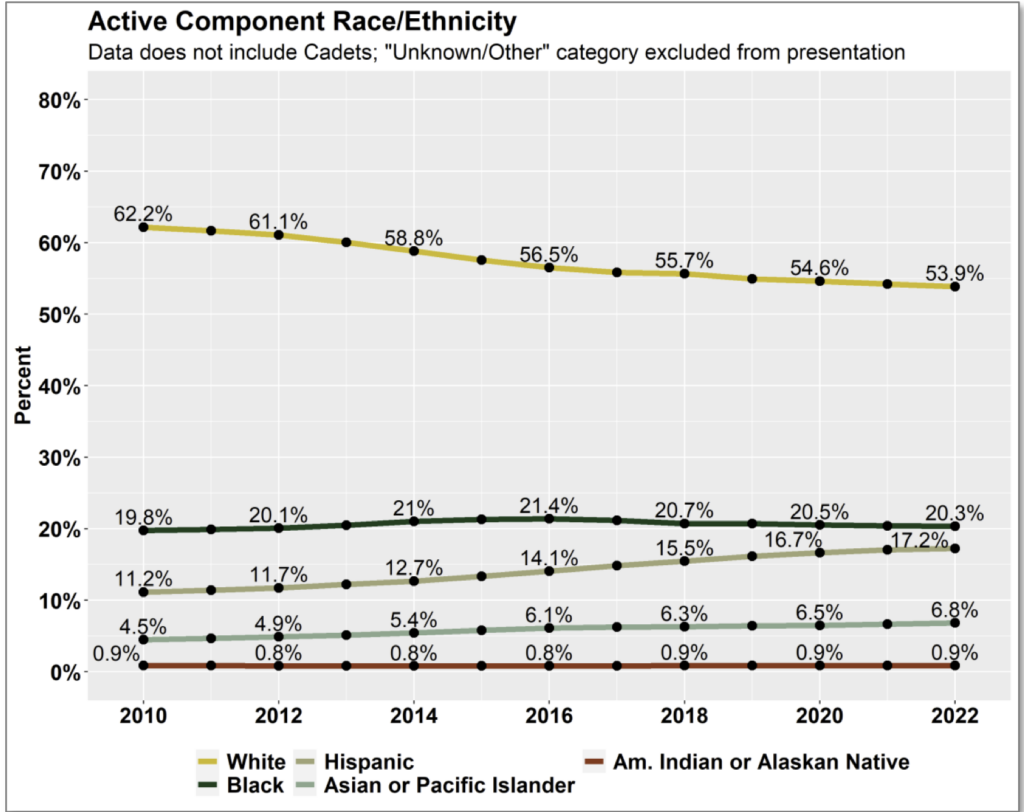
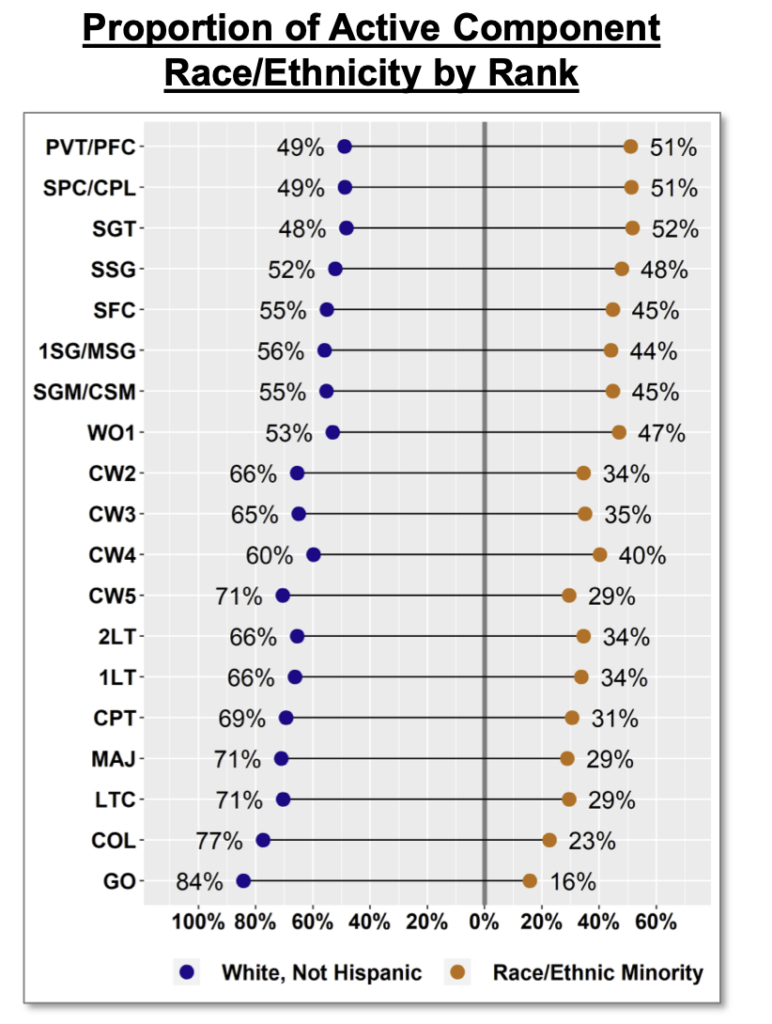
Something is going on here, and it favors white officers. And since the Army was integrated in 1948, I think there has been enough time to pass to allow this to have been fixed if it was going to be fixed by itself.
I would also note that this issue could very much influence recruiting, which is both a legitimate national security concern and something that Republicans have been complaining about.
I would also note that Chief Justice John Roberts disagrees with Crane, insofar as Roberts exempted military academies from the Court’s affirmative action ban (via Military.com):
However, the Court specifically exempted the military academies from its decision on race-based affirmative action. The majority opinion, written by Chief Justice John Roberts, said in a footnote that this policy would not impact how military service academies approached admissions, citing “distinct interests” those institutions have.
“The special nature of military academies and their interests was addressed in an important amicus brief filed in Grutter v. Bollinger almost 20 years ago,” said Lawrence Friedman, JD, professor of law at New England Law Boston. “The Supreme Court’s decision tacitly acknowledges that.”
I meant to comment on this at the time, insofar as I find this to be some pretzel logic: we need to give the military the tools needed to promote diversity, but not for elite educational institutions to do so.
Let me add a bonus side story because the WaPo headline immediately sparked the memory. I was in a graduate seminar at the University of Texas in probably my second year of graduate school when I was trying to say something about “persons of color” and I stumbled over my words (I was still not especially confident in classes at the time) and “colored people” came out of my mouth. I was mortified. Note that this was over thirty years ago and that was an embarrassing screw-up then–so much so that I remember it to this day. I think I quickly mumbled out a correction. And to be clear, I did not say “colored people” in private and had somehow revealed myself. But I certainly had heard my grandparents use the term (although they were more likely to say “coloreds” if not worse) and it was fairly common in older pop culture. I remember it being a time wherein there was a transition away from “black” to “persons of color”/”African American.”
And not to make light of the news story above, this reminds me (and did at the time) of this Bloom County strip from 1988:
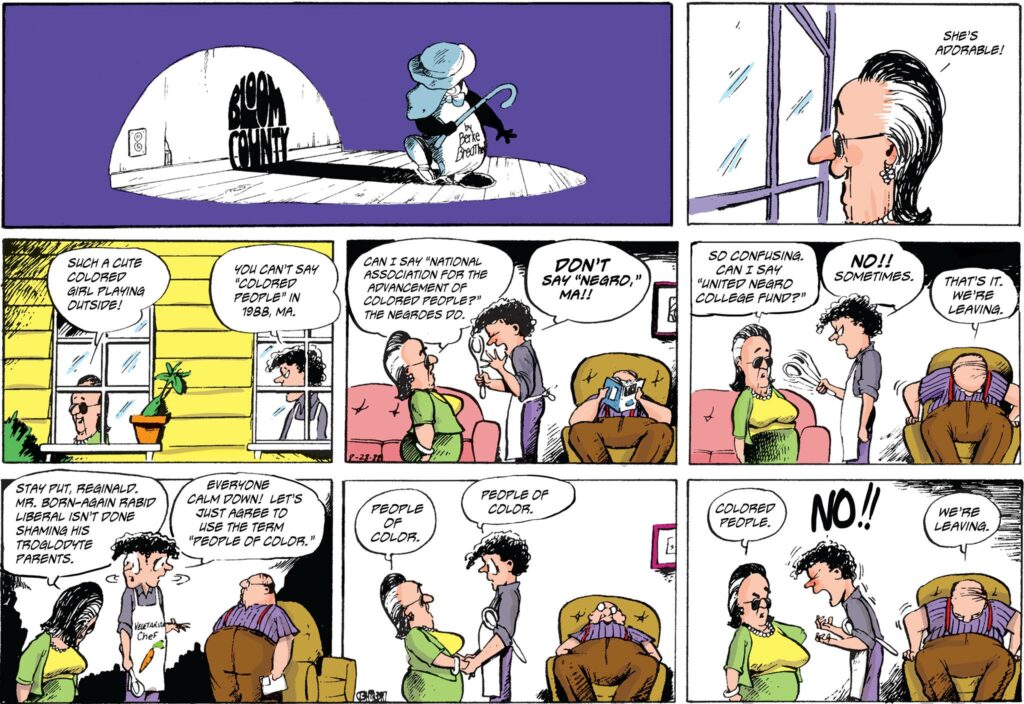
Indeed, since I know I had read that cartoon prior to my seminar flub (which was probably in the 1991-1992 academic year), maybe the whole thing was Berkley Breathed’s fault (who is, coincidentally, a Texas alum).




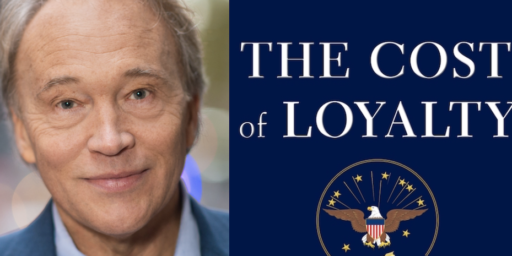
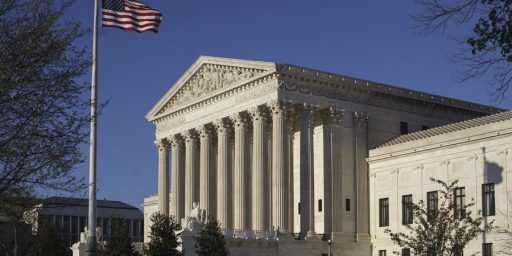
I’m from the Baltimore and DC area, born in 1977, now living in New York, and there’s only one time I can ever remember hearing the word “colored” in this sense used in person. It was on a Utah trip over 20 years ago. Our tour guide was an older white woman, and when we said we were from Baltimore, she said her son had become friends with a “colored boy” in Baltimore.
I know explicit racism is not at all remarkable in today’s GOP, but I was surprised someone as young as Eli Crane (b. 1980) would even be familiar with the term. It’s kind of like the way you rarely hear younger racists refer to East Asians as “Orientals” anymore–it’s not that they aren’t willing to necessarily, it’s just that the word never became part of their vocabulary to begin with. But maybe there’s just something about the Western US.
There are three primary accession paths for officers, and all require a college degree:
– Service academies. I’m very close friends with an admissions officer at a service academy (Air Force) and they heavily try to recruit non-white applicants. The problem is the pool is small, and many other elite institutions are competing for them. Plus, the academies have high academic minimum requirements, which means that to be competitive, kids need to start on a path, especially in math, beginning in middle school.
– ROTC – Only available at some schools and has higher-than-average academic requirements.
– OCS/Direct Commissions and others – These slots are very limited and competitive.
Of course, there are all the usual military requirements on top of these, which tend to weed out many types of people, particularly those from underprivileged backrounds. The military is inherently discriminatory in some ways – it’s definitely ableist and ageist; you will need a waiver if you’ve ever seen a therapist, you can’t be on any ADHD (and many other) meds, you can’t have any significant drug use or criminal history etc. Plus, there are various other factors, such as the desire to join the military in the first place, much less make it a career.
I’m not sure if our family was visiting my grandparents in Danville, Illinois or if we had moved there. So this was late ’50s or early ’60s. I was in the back seat of our car, my dad was driving and his dad was in the passenger seat. We were in town and my gramps had to use a gas station rest room. My dad stopped to let him out. When gramps came back he said: “There was an old darkie in there.”
“Dad! We don’t call them that anymore!” my father said.
I was likely 12 years old at the time.
That was the only time that I ever heard a disparaging remark about Black people from anyone in my family.
@Mister Bluster: My grandfather, southern Kansas, informed me one day that the n****ers in Wichita were going to start a race riot any day now.
It’s just a different world in winter wheat country
If someone was saying “colored” in the 50’s or 60’s, they were using one of the preferred terms among the black community itself. “Black” was considered insulting and demeaning. Trying to judge people’s use of language by what it means half a century later is just silly.
Intent matters. Take the way historically Spanish speaking Americans refer to themselves. There is a debate within the community itself about whether they should be using “Hispanic”, “LatinX” or something else, and pedants both in-group and out anxious to jump in and point fingers over the “actual” meaning of words that are literally changing in the here and now. If someone says “LatinX” now and in 2073 it has passed into insult, it doesn’t make today’s speaker a retroactive bigot. Just as someone using “colored” sixty years ago doesn’t say very much about their prejudices or lack thereof. As I said, intent matters.
If you appreciatively read a lot of stuff written by black leaders in the mid-twentieth century and a bit earlier, you would be more likely to accidentally use the term “colored” than if you were oblivious to such readings because it was a term used by certain of those leaders. But if you would also be more likely to use it if you were an immature white man with a huge chip on your shoulder and was looking for a way to signal to your group that you weren’t going to let no colored boy tell you what to call him. Intent matters.
My grandfather used ‘colored’ all the time, and it came out the same way that the same bigot would use the word ‘homosexual’ or an antisemite says ‘Jews’.
There’s just a way of talking about people as if they were all one horrifying mass of barbarians or utterly beneath your level of existence. For my grandfather, ‘colored’ functioned as both. And it was clear: the contempt and disdain were obvious. And he was just a standard country-club white guy who had black clerks who worked for him as a judge, and who he treated well enough, I suppose, that in the end of their lives he was contacted by a network of old clerks to see what he was up to and he responded. This was a man who belonged to a whites-only country club in Detroit (desegregated, I think, in the late 80s, meaning that I used to play in a whites-only pool as a kid). Hardly an ‘evil’ figure, if you look at American racism. But completely embedded in it and benefitting from being white.
Looking at the chart there are 2 conclusions: the military is incredibly racist or that there’s a standards-based reason for why half of all warrant officers are black, but only 30% end up at the highest-grade.
I don’t think he should be criticized for this gaffe. I’m almost positive that there are any number of groups of people of color (and, yes, I almost did say *ckkklang pkkklanng* deliberately) that he also wants excluded from any focuses on diversity in which the military would engage. I’d even go so far as to speculate that such inclusions would probably mark the extent to which he believes inclusion should be a goal.
Inclusion as “added to the list of those excluded.” Perfectly deconstructive and cognitively dissonant. BOOM!
@Modulo Myself: I suppose that the difference could also be that ethnic minorities are more likely to leave the military for other careers after they have mined whatever training opportunities were available, but not being an ethnic minority nor a military person I’d have no way of knowing. Even then, the phenomenon would only beg the question of why ethnic minorities leave rather than pursue additional promotions/full-term careers. Sticky question.
This, from The Guardian, seems apt, How the US military has failed to address white supremacy in its ranks.
Not too terribly long ago my son and I were deep in the woods with a mechanical problem on my truck.
I said something along the lines of, “Well, I’ll just n*gg*r rig it for now and fix it when we get home.” I had no idea it had even slipped out of my mouth until my son said, “Pop, I can’t believe you said that.” I was slightly embarrassed, apologized and mumbled something about reverting to my high school vocabulary.
Ever since I have referred to such fixes as “redneck repairs.”
Has anyone suggested to Rep. Crane that if he wants to eliminate DEI he should do something to get the white recruitment pool to lose weight and get off drugs. The military aren’t doing this because of some fuzzy commitment to fairness. They’re doing it because they have to to fill the ranks.
@MarkedMan: Many Hispanics find Latinx insulting because it degenderizes the Spanish language and thus attempts to stigmatize its use.
@Raoul: Latinx seems to get used in young, queer communities, precisely because it degenders the language.*
But the majority of Latinos say that they have never heard of it.
(I find it fun to use the gender-neutral X in spots that are not gendered to begin with, like Hispanix, Americanx and Black Folx. This is because I am a troll at heart.)
——
*: I first heard this from a Latino/Hispanic/Latinx labor organizer being interviewed on Chris Hayes’ show, desperately trying to answer quickly and get the topic back onto labor rights. But paying attention afterwards, it seemed to bear out.
I have to admit that I didn’t know there was a stunning difference between CP and PoC. I can’t think of a time I’ve used either, and I’m around a half century old.
Is there some rule about how fast people need to learn updated terminology? Or, as Modulo said, does it matter more what the intent was, often given away by inflection?
I remember using it because I thought it was the preferred term. That was at a time when the N word was still quite common where I lived. Eenie, meanie, miney, mo, catch a tiger by the toe always used the N word instead of tiger. I think I also remember going through a stage when African American was the preferred term, and the taunts from conservatives about whether that should include Egyptians. So if the guy was in his 70s I would not be inclined to make a big deal out of this. Since he is relatively young I would look to see if this is a pattern. (Would note that in my insular part of the world I knew one black person, Ronnie, who was on our football team. I knew zero Hispanics and zero Asians. )
Steve
The insistence on using the term de jeur is one of the biggest wastes of time and effort in the civil rights movement. It distracts from real problems that need serious attention and movement towards change.
My father was born in 1922. His ability to keep up with the “right” label ended with “colored”. To him, he was being progressive and respectful–because that sure as hell wasn’t the term used in Chicago in the 30s.
And the changes in “acceptable” labels aren’t frequently impressed upon the communities they describe from the outside–almost always by white people. These days, it’s “Latinx”–that over 90% of the Latino community hasn’t even heard about, and those that have mostly think it’s stupid.
About 25 years ago I was working for the Madison Metropolitan School District. One of my duties was dealing with W-9 forms. Every vendor that the MMSD paid had to fill out a W-9 tax form. Appended to that was an HUB (Historically Underutilized Business) questionnaire. It was basically a small series of questions that could be used, in aggregate, to determine if MMSD was favoring white males as vendors.
I received a call from a vendor–obviously a black woman from the south–asking about the HUB questions.
HER: What are all these questions at the bottom?
ME: Those are voluntary questions to help us make sure that we’re being fair in how we award contracts. Are you willing to answer them? I’ll help you with any questions you have.
HER: Okay.
ME: So. Are you a woman?
HER: Yeah.
ME: Check the box. Are you African-American?
HER: What’s “African-American”? I don’t know no “African-American”. Wait… You mean black?
ME: Yes. African-American.
HER: I don’t know no “African-American”. I’m black. You mean black, why you don’t just say black?
ME: My bosses say I have to use the term “African-American”. But… between you and me? Yes. It means black. Go ahead and check that box.
HER: Pfft. Don’t know no “African-American”. Y’all should just say black.
ME: Yes, ma’am.
I spent 20 years being told that “black” was bad, derogatory. The only acceptable term was “African-American”.* Now I’m supposed to not only use black, but capitalize it. I’m rapidly approaching the age where I’m going to stop keeping up with the ever-changing terminology and just be “that old man who uses out of fashion labels”.
I really want to avoid using offensive terms (unless it’s my intent to offend), but… could someone please decide what is and is not okay, and stick to it for longer than a hairstyle is fashionable?
I’d rather spend my energy working on fixing actual problems (and we have a lot of them).
========
* Which, of course, ignored the fact that the vast majority of black people aren’t American, and a whole lot of them don’t consider themselves as being African in any significant way.
The ethnic mix of General Officers is mostly a numbers game. Off the top of my head I believe only 2 of 100 Lieutenants will make Bird Colonel. General Officer probability is even less than than. If only 34 out of 100 Lts are non-white…you simply aren’t going to have enough meat on the bone to have a meaning percentage of non-white officers making Colonel and above. You would need to significantly increase the percentage of Non-white officers.
Newsflash, the Military is not the 1st or 2nd choice for many Black young adults. I think DOD is actually overperforming in recruiting to an institution not very highly regarded in the Community (beyond its value to produce social mobility…value that can be realized in 4-8 years in uniform before taking one’s skills to the Civilian sector).
Here I believe my Community to be short-sighted in that I’m convinced the black military veteran has been the guarantor of every strong civil rights push since Reconstruction. Without us, there has been no threat to the “find out” portion of the fuck around corollary.
I think more black men and women should serve in the Military at least 4 years.
@steve: The first time I ever heard the racist version of “eenie meenie miney moe” was in the movie Pulp Fiction, and I misheard it as the “tiger” version the first time I saw it. (I also didn’t understand till years later that the scene was somewhat of an homage to Deliverance.)
@OzarkHillbilly: Dude, same. And I never thought about it much until about 10 years ago, when my then 8 year old looked at me in horror when I said it, and I realized the actual terminology.
Since then, we’ve decided to use the term Jerry-rigged, because I had a friend named Jerry that could fix anything (at least temporarily) with some duct tape, zip ties or super glue.
All of the bad terms are commonly used in this neck of the woods, unfortunately….even in the schools. Trump getting elected really set that trend on fire, those kids picked up on racism now being ok. Technically, they can get in trouble, but both the middle and high school principals are Trumpers, so they just get a talking to about not saying it in front of “Demoncrats”.
@Jim Brown 32:
Back during the time of Vietnam and immediately thereafter, I got in lots of trouble with my fellow students and with my teachers for having the termidity to suggest that in order to have voting rights, you serve 2 years in public service. I didn’t care whether it was the army, the navy, the peace corps, picking up trash or emptying bedpans, you had to do something to demonstrate your willingness to be a contributing member of society.
But again, I AM a Luddite.
@Jax: from Wiktionary:
Verb
jury-rig (third-person singular simple present jury-rigs, present participle jury-rigging, simple past and past participle jury-rigged)
1. (nautical, transitive) To make an improvised rigging or assembly from whatever is available.
2. (transitive) To create a makeshift, ad hoc solution from resources at hand.
Etymology 1
From jury (“for temporary use”, adjective) + rig.
Not to be confused with rigging a jury.
@Modulo Myself:
You’ve misread the chart, half of warrant officers are not black.
@Jim Brown 32:
That meshes with what I’ve seen as well.
Neither.
Does.
Over-representation.
By.
Whites.
@Jax:
@gVOR10:
Jerry = German. Or, at least, it did back when I was a kid during WW2.
Re: the military. They have been engaged in active efforts for decades to make the officer corps more diverse. The process involves not lowering any standard but identifying promising black soldiers and encouraging them to become officers or to move up the ranks. The stats show there is still a long way to go but it used to be *way* worse.
@Joe: Indeed.
@Flat Earth Luddite:
Service guarantees citizenship!
I grew up in a mixed race town in California in the 1950s and 60s (born in1948.) My parents were working class labor union democrats. Our neighborhood was the last white neighborhood before the railroad tracks that separated the races. I had some friends on the other side, but our neighborhood was openly racist with liberal use of the n-word. My mother told us never to use that word, and to say “colored” instead, and to use the “tiger” version of eeny meeny minee mo, even if the neighbor kids were using the other one. But when my father told stories about when someone at work did something he didn’t approve of and that person was one of the few black guys who worked there, he often tacked on at the end of a sentence … “…colored fella…” Meanwhile, black kids at my majority black high school never liked being referred to as “colored,” preferring “black.”
@Jim Brown 32:
History also bares out the role that Black veterans have played as being a critical community that is part of the civil rights struggle. Also, it’s worth noting how Black veterans were also the victims of a lot of racial violence (especially in the post-WW1 period).
https://eji.org/news/remembering-black-veterans-targeted-for-racial-violence-in-the-us/
https://www.army.mil/article/183153/how_war_veterans_impacted_the_civil_rights_movement
@Kylopod: Ockham’s Razar for someone of that person’s age, it is perfectly likely it was a slip of tongue confusion with the politically correct version from the academic formulation ‘people of colour’ (which seems like many things of that academic era derived from a French structure, as one literally uses this formulation in French). For non-egghead anglophones, people of a colour, coloured people…
(the historically rooted reason for the substitution of course are known of course, but that does change it is an awkward one relative to usual Anglphone usage)
That is not to rise to the defence of the person in question on the substance, merely that from a neutrla PoV it is most likely that was indeed the source of linguistic confusion.
@Gustopher: Latinx is another one of those Anglophone eggheads Intellos usages, rooted in Anglophone cultural blindness and monolingualist imperialism, cross-dressing as “inclusive” while imposing an ugly and awkward X formulation from academic world – there are gender neutral manners to render a noun in Latin and one can extend this in Latin derived langauges within the grammatical gender framework. Latine is a choice illustratively that does not do violence to Latin language phonetics nor patterns.
@Lounsbury: She said “colored boy.” And yes, she was talking about an adult man. That shifts Occam’s Razor against charitability in this case.
@Kylopod: ?? sorry
I thought this was about to quote from the OP and news arty quote
and thus my reply